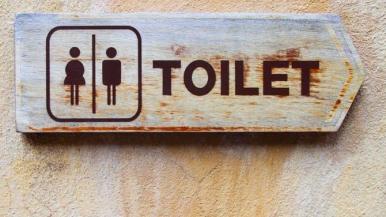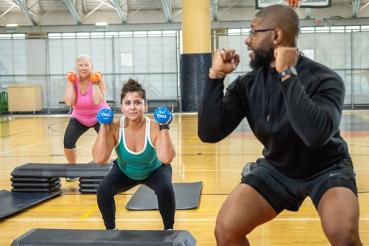Do you go to the bathroom so much that it interferes with your daily life? Or have intense, hard-to-control urges to urinate? If so, you might have overactive bladder.
That means the bladder senses it is full prematurely, when there’s not very much urine stored there, and tells the brain that it’s full and time to go. Sometimes the muscles of the bladder, which you use to push out urine, have started to contract involuntarily and can cause cramping (called a bladder spasm). This can cause a variety of problems, from pain to frequent urination to accidents.
Most people with this condition can manage or even cure it with treatment. But to get treatment, you first have to tell someone you have a problem — which, considering the problem's nature, is sometimes easier said than done.
To start a conversation about a subject many people see as taboo, urologist Sarah Adelstein, MD, shares the six things everyone should know about this common condition.
1. Frequent urination means frequent for you.
Frequent urination is a common sign of overactive bladder. So, what does “frequent” mean?
According to Adelstein, eight times every 24 hours is considered normal. But even if you take 10 or 12 bathroom breaks a day, don't worry.
“It's an individual thing,” says Adelstein. “Some people feel fine going to the bathroom every couple of hours but going that often might bother someone else. Other personal factors like fluid intake, medical problems and use of water pills (also called diuretics) can influence urinary symptoms.”
See your doctor if you go so much that it bothers you, or if you wake up two or more times each night to go to the bathroom. Other symptoms for which you should seek treatment include urinary incontinence (unintentional urination) and pain while urinating.
2. It’s not a normal part of aging.
Urinary symptoms have many possible causes, including overactive bladder, urinary tract infection, enlarged prostate, neurologic problems, diabetes and kidney disease. Often, doctors can’t pinpoint the precise cause.
A slight increase in nighttime urination is normal with aging, however symptoms that disrupt life activities or sleep are not considered normal and should be evaluated.
Overactive bladder is more common in older men and women, but that’s largely because some of the conditions that can cause it — such as enlarged prostate or hormone changes — become more common as people age. So, anyone who has symptoms of overactive bladder, no matter his or her age, should see a doctor.
3. Hiding it is harder than telling someone.
Talking to a doctor might seem embarrassing but suffering in silence can be harder.
“Studies have shown that overactive bladder can decrease the quality of life more than diabetes or heart failure,” says Adelstein. “So, don't hesitate to speak up. I see many patients who have had this problem for years but haven’t sought help because they didn't want to talk about it. When they come in there’s often emotional and physical relief, because they know they have a team on their side, and usually we can find a treatment that works.”
4. There are several options for treatment.
Adelstein usually begins by advising her patients to regulate their fluid intake. “For example, if you’re going to be sitting in a movie or a long meeting, avoid drinking right beforehand and make sure to use the restroom,” she says.
Adelstein also recommends trying these “bladder fitness” tips:
- Sit with your entire backside on the toilet (no hovering or perching on the edge of the seat).
- Empty your bladder every 3 to 4 hours during the day, and only 1 to 2 times per night.
- Urinate for a count of “8 Mississippi.” If it takes less time to urinate than this, it means you could have waited longer.
- No “just in case” peeing.
- Drink enough water to keep your urine a light-yellow color.
- Avoid bladder irritants, constipation and straining.
- Urinate before and after sexual activity.
- Strengthen your core muscles.
- Don’t practice Kegel exercises during urination. This is a handy exercise to identify the correct muscle group, but doing pelvic floor contractions during urination can cause urinary dysfunction.
If lifestyle changes don’t solve the problem, Adelstein moves on to other possible solutions. If overactive bladder has been caused by problems with the pelvic muscles, physical therapy can sometimes cure it. And many patients can get relief from medicines that relax the muscles in the bladder.
For some, though, medications may not do the trick. In these cases, patients may benefit from procedures for overactive bladder. One option is injections of botulinum toxin (commonly known as Botox) into the bladder, which temporarily stop its muscles from contracting. A longer-lasting option is sacral nerve stimulation, in which a doctor implants a small device under the patient’s skin (near the bottom of the spine) to stimulate the nerves that control the bladder.
5. It can signal other serious problems.
Of course, some patients end up needing treatment not for overactive bladder but for its underlying cause.
Because so many serious problems (including bladder cancer and neurologic disorders) can cause overactive bladder, seeing a doctor can serve more than one purpose.
“Not only can we usually solve the urinary symptoms, but we can also make sure nothing more serious is going on,” says Adelstein.
6. Avoiding these bladder irritants may help.
Just as no two people are alike, every bladder is unique. It’s important to identify how your bladder responds to different dietary items, including these common bladder irritants:
- Alcohol
- Artificial sweeteners
- Berries
- Carbonated drinks
- Coffee
- Caffeine
- Cheese
- Chocolate
- Citrus (e.g. orange juice)
- Corn syrup
- Corned beef
- Cranberries
- Curry
- Honey
- Mayonnaise
- Milk and dairy
- Onions
- Pepper
- Pineapple
- Spicy foods
- Sugar (e.g. juice, soda pop)
- Tea (including herbal tea)
- Tomatoes
- Vinegar




